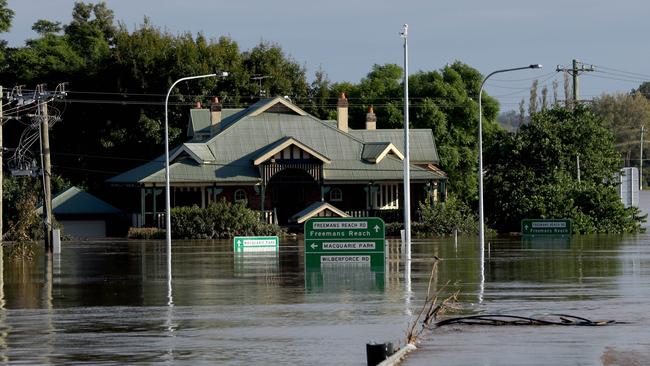In a crisis, leaders must talk, not add insult to injury
When natural disasters occur, what reasonable expectations can citizens have of their governments?

Eighty per cent of the Blue Mountains world heritage area in NSW burnt, as did over 50 per cent of the Gondwana world heritage rainforests in Queensland. University of Sydney ecologist Chris Dickman estimated that more than a billion animals perished.
English television personality Jeremy Clarkson caused a furore when he wrote a column that said God, embarrassed by Australia, had set fire to it, and “people must accept that Australia isn’t meant for human habitation”.
Then, Covid. Let’s not even go there and trigger everyone’s PTSD. And now, these devastating floods.
Because of natural disaster, Australia is becoming “a harder country to live in”. This declaration came from our Prime Minister this week, as he met with grief-stricken people in northern NSW.
We can argue over whether Australia is actually becoming a harder country to live in or not but, right now, the prevailing public opinion says it is. Governments and agency heads must respond appropriately to this sentiment.
When citizens are suffering widespread and catastrophic loss, there is a right way, and a wrong way, for public figures to communicate. The PM and the NSW Premier toured flood zones this week and, for the most part, demonstrated empathy and understanding.
At the other end of the spectrum, Shane Stone, Co-ordinator General of the National Recovery and Resilience Agency, was quoted late last week with this clanger. “You’ve got people who want to live among the gum trees – what do you think is going to happen? Their house falls in the river and they say it’s the government’s fault.” This comment sparked fury and warrants response.
Australians live in a highly regulated, highly taxed, high-cost environment. Whether federal, state or local, government dictates what type of land we are allowed to live on, how many dwellings that land can have, and the type and size of home built.
When a home is built, we cannot move in until a government inspector issues written approval. When we want to renovate, this often requires approval by government before, and inspection by government after.
As for the gum trees we allegedly want to live among, we often don’t have a choice. Plenty of people think gum trees are soil-drying, flammable and dangerous, and do not want them near the house or overhanging areas in use.
To illustrate the point, within a kilometre of our home, there are two houses that were literally cut in half in recent storms, when giant mountain ash trees fell on them. The respective families narrowly escaped with their lives, crawling out of the wreckage in the middle of the night, into the wet and howling darkness.
These gum trees are protected by government, which does not inspect, manage and remove or allow removal, to the extent it should, in order to protect human life. So, for the privilege of living where and how we are told, among the gum trees we are not allowed to cut down, we must pay to our various governments, rates, taxes and levies.
It is understandable then, that people expect services in return, as well as timely rescue in an emergency. No citizen residing in a government-approved dwelling deserves to be insulted, diminished and portrayed as reckless, irresponsible or infantile, by Stone, or anyone else.
That aside, there is an important issue that comes out of all this. When natural disasters occur, what reasonable expectations can citizens have of their governments? How quickly can we expect help to arrive?
This topic is one the PM wrestled with this week, in the flood zone. As he came under heavy fire, Scott Morrison said that the defence force cannot be there on tap, to just appear in an instant and, in the absence of that, communities need to mobilise.
If it is true that natural disasters are going to occur more often, and on a greater scale, then someone in the relevant role (Stone, perhaps?) could engage in some forecasting and communication, right now.
They might categorise the various natural disasters, divide the country into zones, and set some indicative benchmarks around the types of assistance that will likely be delivered to various areas, with approximate response times.
This information could be maintained on a public website. It would hold various bodies to account, but also educate and assist communities, because to be forewarned is to be forearmed. Those who know in advance that in their area help might not arrive for days, might be better prepared. They will know what they need to have on hand, and how they can act within their neighbourhood groups, to save lives.
If governments don’t want people to accuse them of going missing in action in times like this, then governments need to tell people in advance what they can realistically deliver.



It has been a tough few years. Our pandemic experience has been bookended by catastrophic natural disasters. To begin, bushfires. We had the 2019-2020 Black Summer, and the sheer scale of it caused shock around the world. By the end, an estimated 84 million acres had burnt, with more than 2700 homes destroyed and at least 34 lives lost.